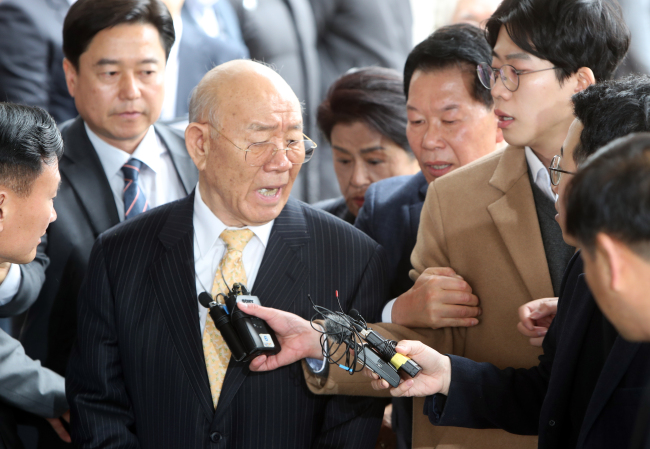Existence of strafing during Gwangju crackdown is key issue at Chun's trial
By YonhapPublished : March 11, 2019 - 13:28
The primary issue of former President Chun Doo-hwan's ongoing libel trial involves his denial of the existence of helicopter strafing at citizens during a bloody military crackdown on the 1980 pro-democracy uprising in Gwangju.
In his memoirs, published in 2017, Chun strongly rebutted the late activist priest Cho Chul-hyun's lifetime claim that he witnessed machine-gunning from helicopters at citizens during the bloodshed suppression, calling him a "shameless liar."
Later, one of Cho's relatives filed a libel suit against him.
In his memoirs, published in 2017, Chun strongly rebutted the late activist priest Cho Chul-hyun's lifetime claim that he witnessed machine-gunning from helicopters at citizens during the bloodshed suppression, calling him a "shameless liar."
Later, one of Cho's relatives filed a libel suit against him.

A key issue at the trial is likely to be whether Chun's insistence of "no firing from helicopters" in his book is true and whether he intentionally wrote the part if he knew the claim was untrue.
Earlier probes by a special investigation committee under the defense ministry and prosecution concluded that there had been machine-gunning from hovering choppers.
A National Forensic Service researcher also appraised that a number of bullet marks discovered on the outer wall of the Jeonil Building, located just across from the South Jeolla provincial government building in Gwangju, 329 kilometers south of Seoul, appeared to be the results of chopper firing. The provincial government building was then the base of citizen soldiers.
In its final report after a monthslong probe, the defense ministry panel said Army helicopters fired at Gwangju citizens on May 21 and 27 that year.
The prosecution also said it has confirmed secret telegrams, drawn up by the US Embassy in Seoul, reporting that there will be chopper firing at citizens and that chopper firing took place.
They have also judged Chun's claim in the memoirs that he had no idea of chopper firing as a lie given that he had received full reports on the crackdown at that time.
The former Army general seized power in a 1979 coup and ruled the country until early 1988. He was sentenced to death in 1996 for treason and bribery. His sentence was reduced to life imprisonment by the highest court, and he was released in December 1997 on a presidential pardon.
If convicted, Chun could face up to two years in prison or up to 5 million won ($4,550) in fines. (Yonhap)











![[Today’s K-pop] BTS pop-up event to come to Seoul](http://res.heraldm.com/phpwas/restmb_idxmake.php?idx=644&simg=/content/image/2024/04/17/20240417050734_0.jpg&u=)





![[KH Explains] Hyundai's full hybrid edge to pay off amid slow transition to pure EVs](http://res.heraldm.com/phpwas/restmb_idxmake.php?idx=652&simg=/content/image/2024/04/18/20240418050645_0.jpg&u=20240419100350)

